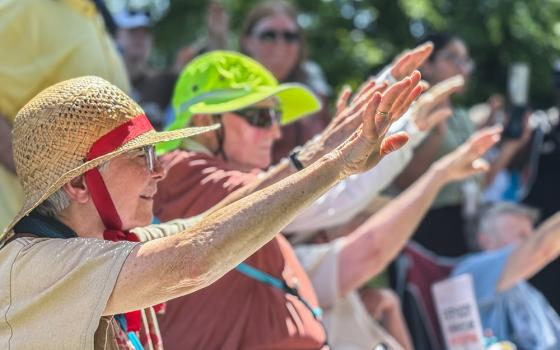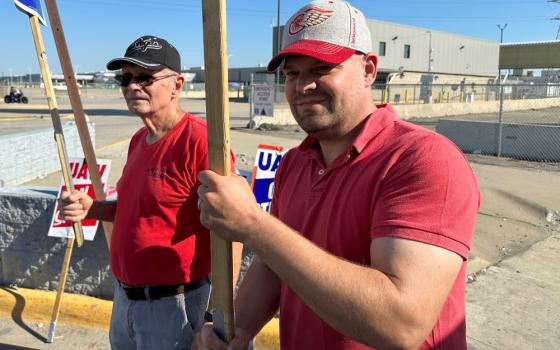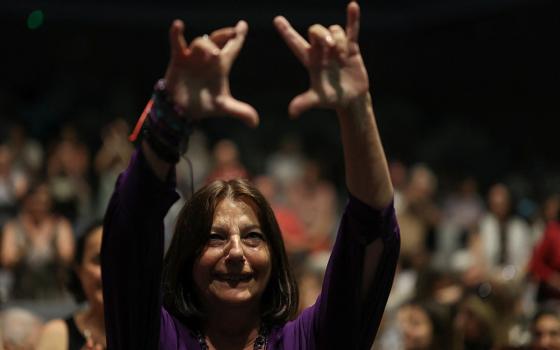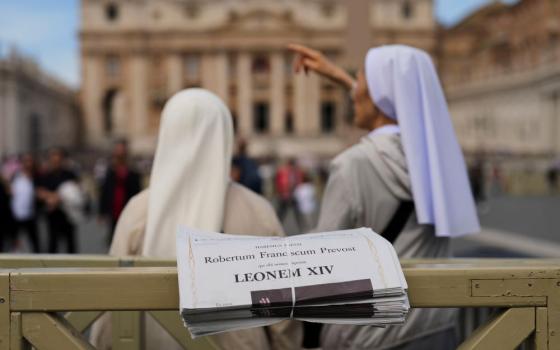
(Unsplash/Jordis Small)
This month, we asked our panelists to think back to their early days in religious life and share a memory based on the question:
What was the most surprising thing to you about religious life?
Some of their answers will be very familiar to other women religious, and some may surprise you!
______
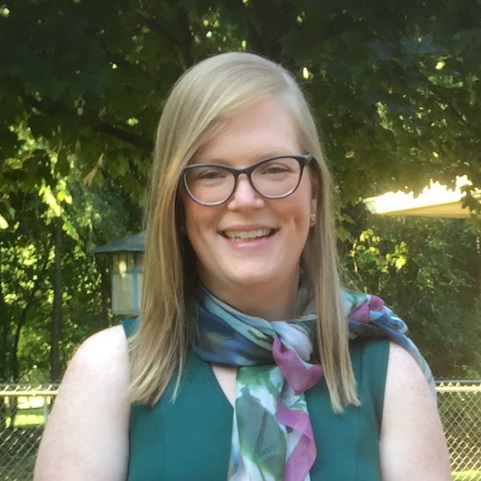 Jane Aseltyne is in first vows with the Sisters, Servants of the Immaculate Heart of Mary in Monroe, Michigan. Before entering, she served as the communications manager at A Nun's Life Ministry and worked in various ministries focused on disenfranchised populations, including teenagers and the elderly. Currently, she is a graduate student at Catholic Theological Union in Chicago pursuing a master's degree in systematic theology and spirituality and is involved in the Together Program, an intercultural cohort of young women religious who are studying at Catholic Theological Union and living in community.
Jane Aseltyne is in first vows with the Sisters, Servants of the Immaculate Heart of Mary in Monroe, Michigan. Before entering, she served as the communications manager at A Nun's Life Ministry and worked in various ministries focused on disenfranchised populations, including teenagers and the elderly. Currently, she is a graduate student at Catholic Theological Union in Chicago pursuing a master's degree in systematic theology and spirituality and is involved in the Together Program, an intercultural cohort of young women religious who are studying at Catholic Theological Union and living in community.
About six months into my candidacy with the Sisters, Servants of the Immaculate Heart of Mary, I moved into a community house for the first time. I had been living quite happily on my own in Toledo, Ohio. I had my own apartment, car, job and routine. I was content living as an independent single woman, yet I knew I was being called to try religious life. Still, I was nervous about leaving behind everything familiar to me.
On moving day, my family and friends helped me pack up and drive to Monroe. When we arrived at the house, the sisters greeted us with a big sign that said, "Welcome, Jane." I slowly began to feel more at ease throughout the day as the sisters helped me unpack and got to know my family. I wondered if I was not gaining more than I was giving up.
As with any transition, there was a period of adjustment. It had been a few years since I'd had housemates, so I had to relearn how to communicate about everyday things like chores and grocery shopping. I had to learn how to plan prayer and community gatherings. And the most terrifying thing? I had to learn to cook.
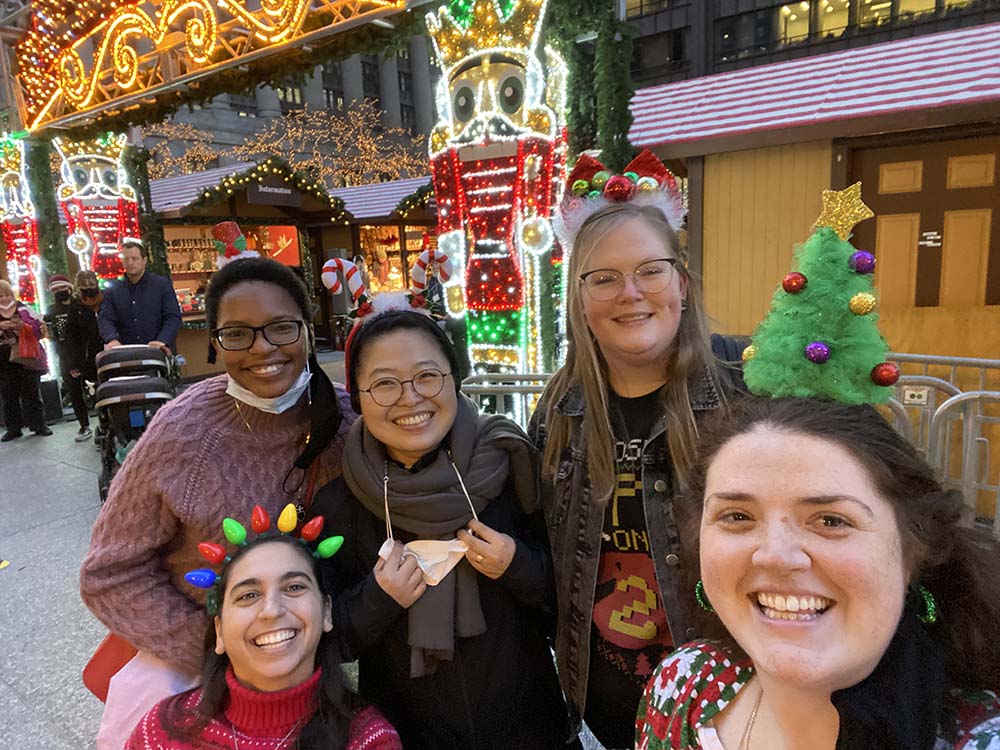
Jane Aseltyne and the sisters she lives with, who are in the Together program at the Catholic Theological Union, visit the Christkindl Market in Chicago last December. From left to right, back row: Passionist Sr. Pulane Makepe, Charity Sr. Youngmi Bae and Immaculate Heart of Mary Sr. Jane Aseltyne. Front row: Notre Dame Sr. Nicole Varnerin and Mercy Sr. Kelly Williams. (Courtesy of Jane Aseltyne)
But it was through these challenges (and several kitchen mishaps) I realized that I had not given up as much as I thought. To my surprise, I gained a whole new network of support and friendship. I've had many opportunities to try new things that might not have been possible on my own. Through the encouragement of my sisters, I've grown in my love for theology and desire to be with those on the margins of our society.
I am amazed at how much my world has expanded since candidacy. I've built friendships with sisters around the world. I've traveled across the United States to different motherhouses, learning how sisters have responded to the world's most pressing needs for centuries. I've spent time with our Immaculate Heart of Mary sisters in Juárez, Mexico, ministering to and with our sisters and brothers at our southern borders. And for the last two years, I've been working on a master's degree in theology at Catholic Theological Union.
No matter which life form a person chooses (religious, married or single), it requires some amount of sacrifice. And for me, it was in letting go of the familiar that I found new life.
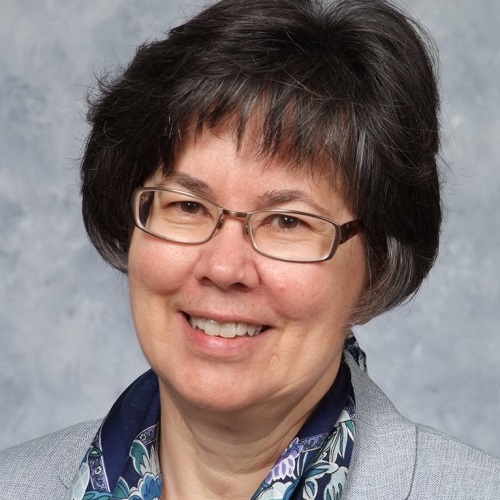 Mary Kathleen Glavich is a Sister of Notre Dame from Cleveland. In early ministries, she taught every grade from first to 12th. Later, she served as a vocation director for her diocese and as a pastoral associate in a parish. A writer and editor, she has published many articles and more than 90 books and was a featured speaker at a catechetical conference in the United Arab Emirates and Oman.
Mary Kathleen Glavich is a Sister of Notre Dame from Cleveland. In early ministries, she taught every grade from first to 12th. Later, she served as a vocation director for her diocese and as a pastoral associate in a parish. A writer and editor, she has published many articles and more than 90 books and was a featured speaker at a catechetical conference in the United Arab Emirates and Oman.
I live in an apartment building where half the residents are sisters and half are laypeople. Each Sunday, I play the piano for them.
The other day, 87-year-old George commented, "Did you ever imagine that as an old lady, you'd be playing the piano?"
"No, George, I never imagined that." I never thought I'd be living with men, either.
As my life as a Sister of Notre Dame unfolded, there were countless things I never imagined. The most soul-shaking surprise is that my community is radically different from when I entered. Religious life is not static but evolving, creating new wineskins for new needs.
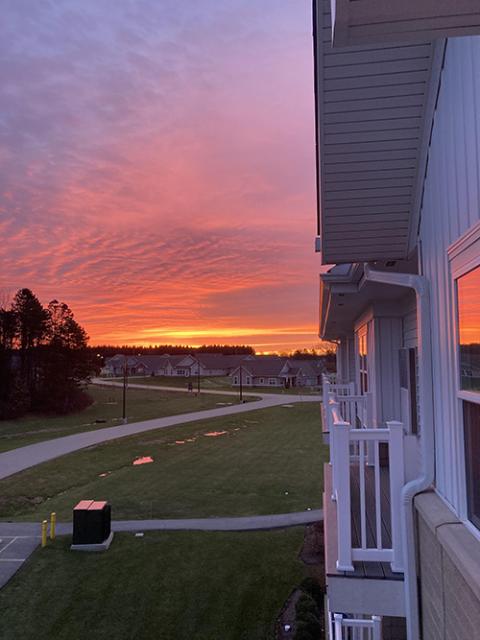
God continues to surprise Sister Kathleen with spectacular sunrises and sunsets from her balcony at Notre Dame Village. (Courtesy of Kathleen Glavich)
My early formation experience was akin to Marine boot camp. Virtually isolated from family, friends and world news, we were introduced to practices such as acts of humility, penance, corrections and asking permission. My motto then was based on Job's words: "Even though he kill me, I will still love him" (Job 13:15).
Along came the Second Vatican Council's whirlwind, turning religious life as I knew it upside-down. Suddenly, we could drive, own a watch, go to weddings. One sister remarked, "Everything I gave up, God is giving back to me."
Most importantly, my community claimed its identity as an active apostolic order. Reorienting ourselves, we shed the customs of cloistered nuns and became the sisters we were meant to be: women nurturing God's kingdom by engaging with the world.
Gone was our rule of silence. We could speak freely with each other and others. People were no longer excluded from our convents. Rather, we practiced hospitality. We could also visit others' homes. Where once only sisters were our cooks, nurses and housekeepers, now laypeople served us in various departments. They and associates, another innovation, became like family.
For most of us, multilayered black habits were replaced by a practical, colorful wardrobe, making us more relatable to the laity.
Formerly, we were regarded as excellent educators. But then, in the United States, our ministries expanded beyond classroom walls. For example, a sister ministers as a lawyer in custody trials; one sister advocates for poor inner-city women; and another founded Blessing House to care for young children of working parents. Sisters assist immigrants at the border, and some work to eliminate human trafficking. Afghan families stay at houses on our property. A salient sign of our focus on social work is our Justice, Peace, and Integrity of Creation National Office.
No, I never imagined this metamorphosis of my community. Still, there are constants: vows, community life, prayer and, above all, deep-seated love of God and desire to serve God's people. I adopted a new motto: "My joy lies in being close to God" (Psalms 73:28).
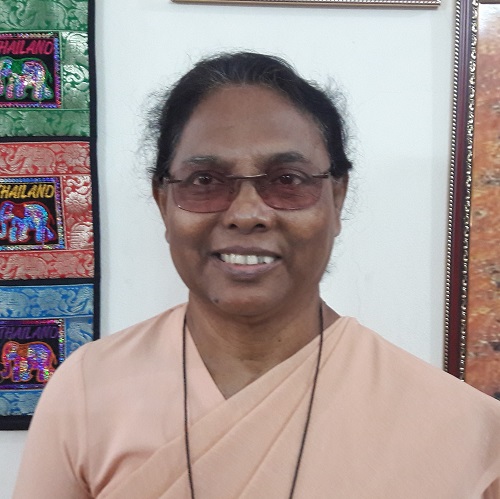 Probha Mary Karmokar is a Sister of Our Lady of the Missions in Bangladesh. Before final vows, she worked as a social worker in a rural village, lived with an international group of priests and religious of different congregations in a house of prayer, and directed an urban hostel. Later, she served in initial formation as provincial novice director and worked as a formator in Kenya. After studies in spiritual and pastoral theology, she served in Rome as a general counselor. Returning to Bangladesh, she was elected provincial superior for six years and is currently on the Bangladesh province leadership team.
Probha Mary Karmokar is a Sister of Our Lady of the Missions in Bangladesh. Before final vows, she worked as a social worker in a rural village, lived with an international group of priests and religious of different congregations in a house of prayer, and directed an urban hostel. Later, she served in initial formation as provincial novice director and worked as a formator in Kenya. After studies in spiritual and pastoral theology, she served in Rome as a general counselor. Returning to Bangladesh, she was elected provincial superior for six years and is currently on the Bangladesh province leadership team.
The "God of surprises" surprises us continuously if we are paying attention. A surprise can be a wonderful experience or an unexpected temptation. But I think there is no trial or temptation that is unique to us as individuals. We often face what others have faced.
When I pronounced my first vows, I felt sure I had given my life to God forever. I was very energetic, enthusiastic, ready to take on challenges of all sorts and confident in everything. I was a very happy religious missionary sister! And as a temporary professed sister, I had a wonderful surprise: living in an international and intercongregational community of men and women religious in a house of prayer. I'm grateful today that I overcame my concerns and fears and — somewhat excited — said yes to my provincial's request.
After six years in temporary vows, I was ready for my perpetual profession on April 9, 1983. We were celebrating 100 years since the arrival of our founder, Adèle Euphrasie Barbier, in Bengal; some diamond, golden and silver jubilees; and perpetual vows for two of us. Extraordinary and grand preparations were made. Some sisters from abroad arrived to celebrate with us. The whole convent was beautifully decorated, and all were excited.
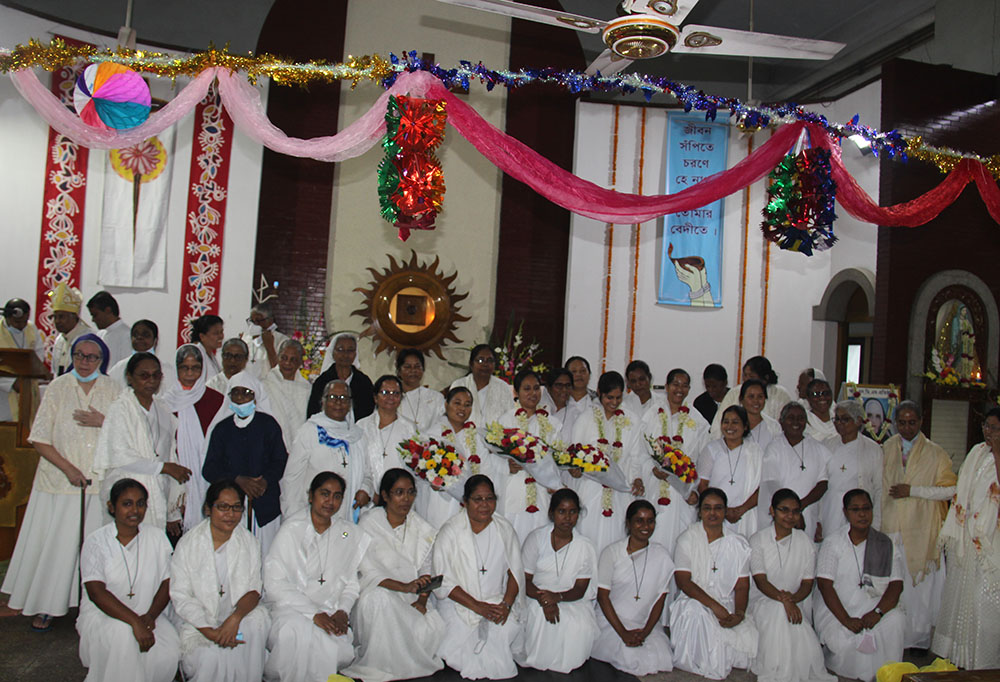
Final vows of four Sisters of Our Lady of the Missions in Bangladesh Dec. 17, 2021 (Courtesy of Probha Mary Karmokar)
In Bangladesh, we have some traditional and culturally meaningful rituals the night before perpetual profession. After that, the two of us who would make perpetual vows went to the chapel for a time of silent prayer.
Suddenly, I had a very strong feeling of anxiety and became extremely frightened. Questions and doubts disturbed my joy and peace. I was restless and very nervous about my future.
At one point, I felt I needed to tell the provincial that I could not make my perpetual vows. I was not prepared for these feelings — surprised and fearful at what was happening — and I cried before the Blessed Sacrament.
Then I heard a voice inside: "Do not be afraid. I am with you on your journey. I will never leave you alone, and I love you."
Through these words of grace, God calmed my frantic spirit, and I can see now that I had been trusting more in myself than him. This unexpected and frightening trial at a crucial moment in my life has helped me believe more deeply what Paul attests in 1 Corinthians 10:13: Our faithful God will not let us be tried beyond our strength. It taught me the importance of abiding in the word of God and heeding it always to build the strength necessary to face trials and temptations.
Now, I feel joy as I reflect on my 44 years of religious life and am grateful for both the good surprises and the frightening surprises that helped me to grow!
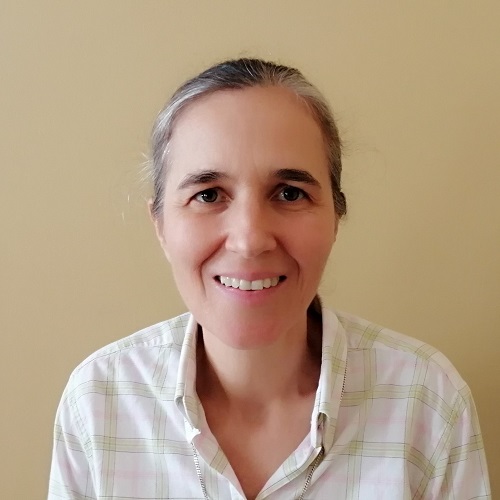 Mafalda Maria Gaudêncio Franco Leitão is from Lisbon, Portugal, and is a member of the Congregation of Servants of Our Lady of Fátima. With a background in educational sciences, her special research interests include education for sustainable development (training teachers in Portuguese-speaking African countries on water issues); education for global citizenship and integral education; and climate migrants and refugees. She taught physics and chemistry in secondary schools and worked in youth ministry in various parishes and dioceses. Currently, she serves as general counselor for her congregation.
Mafalda Maria Gaudêncio Franco Leitão is from Lisbon, Portugal, and is a member of the Congregation of Servants of Our Lady of Fátima. With a background in educational sciences, her special research interests include education for sustainable development (training teachers in Portuguese-speaking African countries on water issues); education for global citizenship and integral education; and climate migrants and refugees. She taught physics and chemistry in secondary schools and worked in youth ministry in various parishes and dioceses. Currently, she serves as general counselor for her congregation.
In the Spirit, everything is new or renewable. This is a great aim for religious life: "to make all things new" (Revelation 21:5) through the paschal mystery of the One we follow.
The most surprising thing to me about religious life is the sense of renovation, the capacity to change constantly according to the needs of people or place. This allows the Gospel to be widely spread, inviting everyone from everywhere to share the happiness of the news that we are the beloved of God, our Father. Each religious institute shares this mission.
I belong to a quite young but centenary congregation, founded in Portugal in 1923. Our charism gives us characteristics like closeness to people, deep listening to the signs of the times and places, living the mystery of the Incarnation in the world. This requires constant attention to the new.
Advertisement
Therefore, over these 98 years, our congregation:
- Opened a school that sheltered the birth of our congregation and later opened two different institutions (education and social work) that allowed us to work in society with civil permission (religious life was forbidden in Portugal until 1941);
- Worked in a Catholic newspaper (1923-75) when the Catholic press played an important role in the struggle for religious freedom;
- Developed pastoral work in seminaries (until 2005), worked in parishes, opened many social centers in villages (after 1946), and contributed to the creation of a new university in Bissau (2007);
- Shared the troubles of civil war with people in Mozambique and Angola, promoting women's development, education and health (beginning in 1972).
As a young physical engineering student, I was surprised by this way of life in the 1990s and decided to take part in such a challenging, ongoing project. In fact, we keep listening to the surprising novelty of the Spirit, inviting us to adjust our mission to new demands, like:
- Developing a project in Mozambique that networks with other youth centers in Mozambique, Angola and Portugal to empower young women, helping them avoid school absenteeism and early pregnancy;
- Establishing PROSOCIAL, a nongovernmental organization that allows us to access the business world and to raise funds for the development of our mission;
- Creating the Luiza Andaluz Centro de Conhecimento (Luiza Andaluz Knowledge Center) in charge of increasing awareness about Luiza Andaluz, foundress of our congregation. It will hopefully be a contemporary and avant-garde space where restless seekers of truth can find the face of God and express it in new languages.
Surprisingly, the spirit of Jesus will lead religious life — as he always has — to a vocational renewal and to an update of the mission needed in our contemporary world.
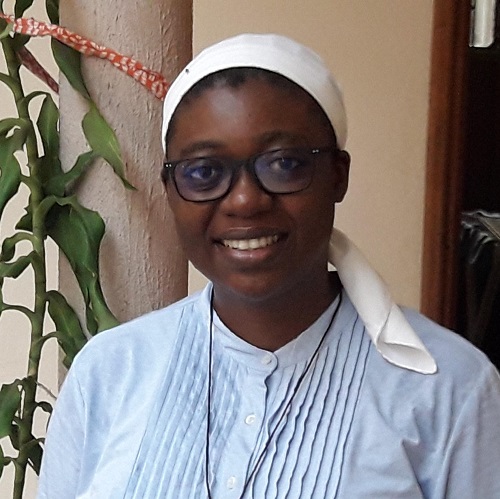 Elise Solange Maga is a Sister of the Divine Will in Cameroon. With an academic background in bilingual letters, pastoral theology for religious, and secondary education, she also earned diplomas in formation and vocational animation in Rome. She has had a variety of pastoral experiences and worked in justice/peace ministry with Caritas, and with children and young people, widows, the sick, and young people in vocational discernment. Currently, she teaches languages and religious studies at a bilingual college in Cameroon. She is also a parish catechist, animates the meetings of living ecclesial communities, and accompanies youth.
Elise Solange Maga is a Sister of the Divine Will in Cameroon. With an academic background in bilingual letters, pastoral theology for religious, and secondary education, she also earned diplomas in formation and vocational animation in Rome. She has had a variety of pastoral experiences and worked in justice/peace ministry with Caritas, and with children and young people, widows, the sick, and young people in vocational discernment. Currently, she teaches languages and religious studies at a bilingual college in Cameroon. She is also a parish catechist, animates the meetings of living ecclesial communities, and accompanies youth.
The desire for religious life began very early in my childhood. Each time I saw sisters, I felt that was the path I wanted to follow — that "special" form of life.
Sharing this dream with those around me brought comments like: "So you won't get married? You won't have children?" Such a choice of life seemed a waste for many. But my longing continued.
As I grew up, the first aspect of religious life I came across was detachment, leaving all behind. Then there were the evangelical vows that were presented as don'ts: not possessing, not getting married, and no freedom.
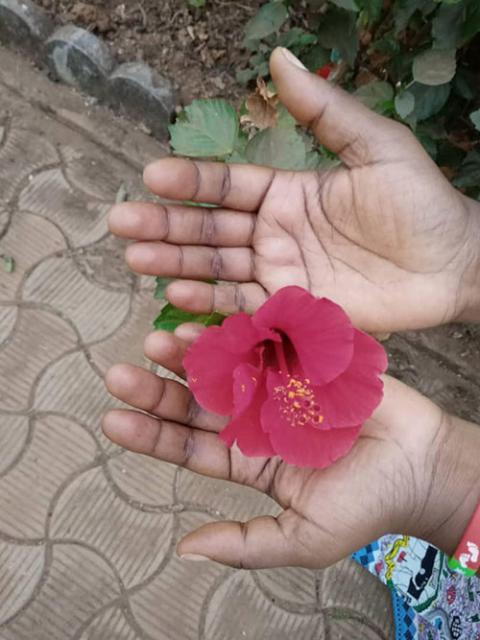
Sustained by the support I get in community, I can express the beauty of the gifts with which God has blessed me. (Courtesy of Elise Solange Maga)
With these and other ideas that sounded like restrictions, I took my first steps to the convent. Fortunately, the novitiate served to destroy my preconceptions about religious life.
Surprise No. 1: Falling in love with Christ was the main idea, not just respecting rules. My future depended on the relationship I could establish with him because this was the foundation of my life as a religious. I discovered that religious life was not a life of don'ts, but of doing things in a special way.
For those who thought I wouldn't get married, I could say I'm the bride of Christ. To those who thought I won't have children, I could show all the children of the world I'm able to embrace because the horizon of my life has been made so wide by Christ. This discovery led me to choose "abide in my love" (John 15:9) as the motto for my religious profession.
In the love story between Christ and me, religious vows are "sweet bonds of love," as our founder, Gaetana Sterni, said. Day by day, I grew in the belief that "my beloved is mine and I am his" (Song of Songs 2:16).
The small seed of vocation sown in me has taken root in Christ's model of life, and thanks to his abundant love, I can bear branches upon which the needy can lean and fruits on which to feed.
What amazes me more is the fact that the horizon of my life opens to all cultures, faces and realities I meet. As a woman, I experience fecundity. I meet people, let go, risk and keep on moving. I sing and walk on the paths of the world, striving to reflect God's love in spite of my weaknesses.
Sustained by the support I get in community, I can express the beauty of the gifts with which God has blessed me, not like an island but in a colorful manner, forming the rainbow that shows God's love for humanity.


